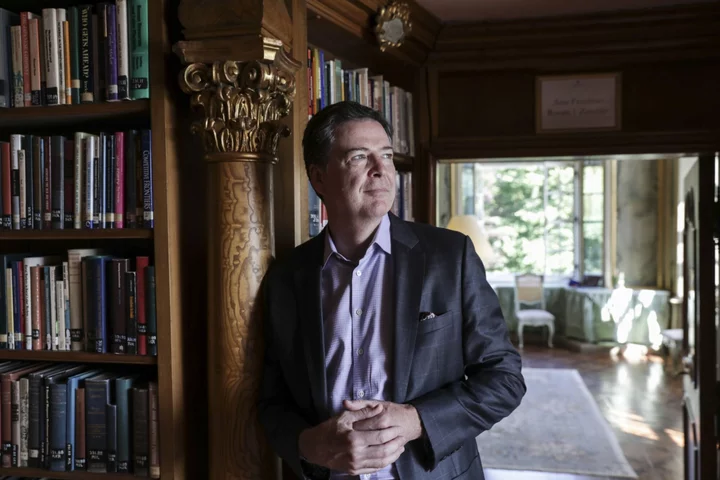James Comey is probably the most famous FBI director since J. Edgar Hoover, thanks in large part to his decision to reopen an investigation into Hillary Clinton’s use of a private email server in the final stretch of the 2016 presidential race. (Two years later, a Trump-era Justice Department report determined that the decision reflected a “serious error in judgment.”)
After getting fired by President Donald Trump, Comey wrote his first memoir, A Higher Loyalty, which came out in 2018 to great acclaim. Comey’s ability to contextualize information with a measured, personal perspective was a welcome tonic for a polarized time, and it soon hit the New York Times bestseller list. His second, Saving Justice, was published in 2021 and met with fainter praise. Writing in the Times, author Joe Klein called Comey “slightly smarmy in his rectitude.”
Now, Comey has branched out by debuting his first piece of fiction, a gritty potboiler called Central Park West (Mysterious Press, $30; May 30).
Despite the title, very little occurs on Manhattan’s Upper West Side, other than a murder that sets the book in motion. Comey locates the majority of his story in Lower Manhattan’s compound of government courthouses and offices. Not coincidentally, these are buildings at which Comey worked during his time in the US Attorney's Office for the Southern District of New York.
While this is technically a crime story, Comey lavishes attention and care on the ins and outs of the prosecutorial process, dropping tidbits about special entries and exits, jurisdictional squabbling, and FBI lore. In his acknowledgments, Comey notes that the book is a work of fiction but that “the places and the procedures are as accurate as I could make them.”
If it stuck to these places and procedures, the book would be a fun chunk of gossip. But the problem with novels is that they tend to require both characters and a plot. It’s here that Comey runs into trouble.
Read More: James Comey: Leadership, Trump, Why He’s No Longer a Republican
The book’s protagonist is Nora Carleton, a textbook Strong Woman with an equally strong sense of justice. “Being an Assistant US Attorney for the Southern District of New York was her dream job,” Comey writes. “And she was determined to look the part.”
A frequent mob prosecutor, Nora gets swept up in an investigation that should be an open-and-shut case. After being exposed for sexual misconduct, a former governor is found dead in his penthouse apartment. His ex-wife Kyra, who is also a Strong Woman, is soon on trial; witnesses place her at the scene of the crime. But when new information comes to light, Nora, along with a band of uniformly good-hearted, upstanding, hardworking civil servants, commits to setting the record straight.
Given that Comey previously headed America’s leading federal law enforcement agency, it’s tempting to psychoanalyze the ways in which he fails to comprehend, let alone vivify, the lives of others. The degree to which he uses characters’ backgrounds as a shorthand for motivation and personality could uncharitably be interpreted as a form of profiling.
Certainly, Comey, who is 6 feet, 8 inches tall, is attuned to height, race and age. Carmen Garcia, chief of the violent and organized crime unit, is “a five-foot-three ball of energy and humor, with the dark eyes and tan skin of her native Puerto Rico.” Kyra, the late former governor’s ex-wife, is a “strikingly beautiful thirty-nine-year-old woman, her high cheekbones framed by a long honey-blonde Jennifer Anniston bob cut.”
Special Agent Jessica Watson is a “twenty-nine year-old fresh-out-of-Quantico agent and former Northern California high school chemistry teacher, with smooth dark skin and a soft Afro kept very short.” Watson was persuaded to join the agency after meeting a recruiter whom Comey describes as “a ramrod straight Black woman in her forties.”
It continues: The US Attorney’s secretary, Georgene Jackson, is a “heavyset woman in her early sixties, with a round face, thick braids kept tied back for work and warm eyes.” Her voice, Comey writes, “combined the dropped er of a longtime ‘New Yorkah’ with the lilt of her childhood in Trinidad.” Benny Dugan, a tough federal investigator is “six foot five, 250 pounds of Brooklyn.” A thief who goes by “Frenchie” is “a handsome man with thick wheat-colored hair” who is “normally charming and confident, traits that had been essential to his living to the age of forty-eight.”
Salvatore Butler, a mob lawyer, is “a block of a man—five foot nine and 220 pounds.” I don’t believe we learn Butler’s age; Comey is determined to leave some things, it seems, to our imagination.
But not many. Comey telegraphs his plot twists so explicitly, and so far in advance, that the book effectively lacks a horizon. He does have one trick up his sleeve: Bewilderingly, the governor’s murder is solved with a third of the book to go, leaving Comey to devote its remaining 100 or so pages to the prosecution of the perpetrator—whose fate is never in doubt.
In his first two memoirs, Comey’s ability to relay critical information played to his favor. He was recounting facts that in and of themselves were of interest. But in Central Park West, Comey’s strength is a weakness. As he plods through the novel, there’s no narrative tension—ever—so much so that it has the enervating quality of someone recounting a TV show they’ve seen the night before.
“You’re a good prosecutor,” one character says consolingly. “Just doubt yourself more, because we all make mistakes.” The same could be said to Comey.

